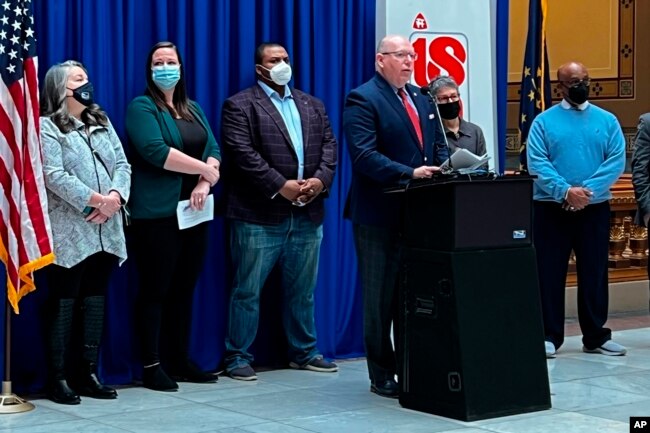K12における批判的人種理論論争
過去の政策による大罪を認めたくない人種による抵抗と読み取れます。
トランプ氏の影響も否定できないように思います。
深い心の闇。
基本的には、単一民族により形成されている日本からは推し量ることができない歴史問題がアメリカには横たわっています。
これ以上の分断の起きないことを願います。
VOAで英語を学び、批判的人種理論の理解を幾らかでも深めたいものです!!
各州が人種を教える制限を可決、教師は'文化戦争に巻き込まれる' (和訳)
States Pass Limits on Teaching Race, Teachers ‘Caught up in a Culture War’
Feb 16,2022
アメリカの保守的な州では、公立学校での歴史や人種の教え方を規制する法案の提出が増えています。また、地域の学校や教育委員会に対する保護者の監督を強化するとしています。
教育委員会は、学区の予算や教育上の決定を監督する、選挙で選ばれた議員のグループです。
インディアナ州では、人種、歴史、政治を教室で教える方法を制限する法案が可決されました。また、保護者が学校に対して苦情や法的措置を取ることも認めています。
現代における人種主義や差別をどのように教えるべきかについて、アメリカ人の意見は分かれていることが、政策研究機関であるAPMリサーチラボの最近の調査で明らかになりました。成人1,200人を対象にした調査では、49%が学校では "米国で現在も続いている奴隷制や人種差別の影響 "を教えるべきだと答えました。しかし41パーセントは、学校は人種差別の歴史は教えるべきだが、"今日の人種関係については "教えるべきではないと答えています。
回答は人種によっても大きく分かれました。黒人の79%が人種差別の現在進行形の影響について教えるべきだと答えたのに対し、白人の41%だけが同じように感じています。
歴史的な人種差別や奴隷制度が今日の生活にどのような影響を与えているかを教えることは、Critical Race Theory、つまりCRTの中心的な考え方です。Critical Race Theory批判的人種理論とは、人種差別と白人至上主義がいかにアメリカの社会、法律、政策を形成してきたかについての理論です。また、共和党の議員からも攻撃を受けています。
1月、新たに選出されたバージニア州知事、共和党のグレン・ヤングキンは、批判的人種理論を禁止する州知事命令に署名しました。テネシー州やテキサス州などの共和党系の州でも昨年、同様の法律が可決されました。しかし、実際にどれだけの学校がCRTを教えているかは不明です。また、このような法律の批評家は、人種差別を教えようとすると、批判的人種理論というレッテルを貼られると言います。
民主党の米下院議員アレクサンドリア・オカシオ・コルテスは、The New Yorker 誌との最近のインタビューで、歴史の教え方を制限しようとする試みは、米国南部の悪名高いジム・クロウ時代に戻るようなものだと述べています。1960年代まで数十年にわたって施行されていたジム・クロウ法は、生活のあらゆる分野で実質的に黒人を差別していたのです。この時代、人種差別と奴隷制は、教えられるとしても、ほとんど白人の視点からのみでした。
親の’権利章典’
ヤングキン氏のような共和党の議員は、学校で何を教えるか、カリキュラムとも呼ばれる、について、親や家庭がもっと発言権を持つべきだと主張しています。そして、多くの州で、親が学校をよりコントロールできるようにするための法案が提出されています。APMの調査によると、アメリカ人の41%が、人種をどのように子供に教えるかについて、親が最も影響力を持つべきと考えていることがわかりました。
NBCニュースの報道によると、12の州で、学校に教材のオンライン公開を義務づける法案が提出されています。これは、共和党が中間選挙を前に、保護者の’権利章典’を求めている全米規模の大きな動きの一部です。
教師たちは、親はすでに自分の子供が何を学んでいるかを見ることができると言います。教師たちは、この法律が不必要な仕事を生み、職業上の独立性を脅かしかねないと懸念しています。
教育関係者は、保護者に情報を提供することに反対しているわけではないと言います。しかし、この新しい法律が検閲をもたらし、より多くの教師が職を去ることになる危険性があると見ています。
この案を検討している州は、オハイオ、アリゾナ、フロリダ、ジョージア、インディアナ、アイオワ、ミシガン、ノースカロライナ、ウェストバージニアなどです。同様の法律は、ペンシルバニア州とウィスコンシン州の民主党知事によって阻止されています。
ケイティ・ピーターズ氏は、オハイオ州トレドで高校教師をしています。彼女はAP通信に、この法案は "何らかの隠蔽工作が行われている "ことを示唆していると語っています。さらに彼女は、「見ようとする親は、常にアクセスすることができた」とも付け加えています。
保守派の議員たちは、両親が教室の教材や学業、医療、安全の記録にアクセスできるようにする両親の権利の法案を要求しています。また、校舎への立ち入りなども許可することになります。
スコット・ディマウロ氏は、オハイオ州最大の教職員組合の会長です。彼は、このような法案が、COVID-19の間に起こった教職の辞職や退職の増加に拍車をかけることを懸念しています。
教師たちは、"自分たちが作り出したわけでもない文化戦争に巻き込まれたと感じている "と彼は言っています。
States Pass Limits on Teaching Race, Teachers ‘Caught up in a Culture War’
Conservative American states are introducing more bills controlling how history and race is taught in public schools. They are also giving parents more supervision over local schools and school boards.
A school board is a group of elected officials who supervise a school district’s budget and educational decisions.
A bill passed in Indiana that limits how race, history and politics can be taught in the classroom. It also permits parents to bring complaints and legal action against schools.
Americans are divided on how racism and discrimination in the present day should be taught, a recent study by the APM Research Lab, a policy research center, found. In a survey of 1,200 adults, 49 percent said schools should teach the “ongoing effects of slavery and racism in the United States.” But 41 percent say schools should teach the history of racism, but not “about race relations today.”
Answers were also very divided by race. While 79 percent of Black people surveyed said the ongoing effects of racism should be taught, just 41 percent of whites felt the same.
Teaching how historical racism and slavery affects life today is a central idea in Critical Race Theory, or CRT. Critical race theory is about how racism and white supremacy have shaped American society, laws and policies. It has also come under attack from Republican lawmakers.
In January, newly-elected Virginia governor Republican Glenn Youngkin signed an executive order banning Critical Race Theory. Republican states including Tennessee and Texas passed similar laws last year. But it is unclear how many schools actually teach CRT. Critics of such laws also say that any attempt to teach racism is labeled as Critical Race Theory.
In a recent interview with The New Yorker magazine, Democratic U.S. representative Alexandria Ocasio-Cortez said the attempts to limit how history is taught is like returning to the infamous Jim Crow Era in the Southern U.S. Jim Crow laws in place for several decades until the 1960s discriminated against Black Americans in effectively all areas of life. During that time, racism and slavery was almost only taught from the white perspective, if it was taught at all.
Parent ‘Bill of Rights’
Republican lawmakers like Youngkin argue that parents and families should have more of a say in what is taught in schools, also called the curriculum. And many states have introduced bills that give parents more control over schools. APM’s study found that 41 percent of Americans think parents should have the most influence in how race is taught to children.
NBC news reports that 12 states have introduced bills that require schools to put their teaching materials online. It is part of a larger national push by Republicans for a parents’ “bill of rights” ahead of the midterm, congressional elections.
Teachers say parents can already see what their children learn. They worry that the laws would create unnecessary work and could threaten their professional independence.
Educators say they are not against keeping parents informed. But they see a risk that the new laws will bring censorship and more teachers leaving the profession.
States considering some version of the idea include Ohio, Arizona, Florida, Georgia, Indiana, Iowa, Michigan, North Carolina and West Virginia. Similar laws have been stopped by Democratic governors in Pennsylvania and Wisconsin.
Katie Peters is a high school teacher in Toledo, Ohio. She told The Associated Press the bill suggests “there’s some hiding happening.” She added that “the parents who have cared to look have always had access.”
Words in This Story
survey — n. an activity in which many people are asked a question or a series of questions in order to gather information about what most people do or think about something
curriculum — n. the courses that are taught by a school, college, etc.
censorship— n. the system or practice of censoring books, movies, letters, etc.
access — n. a way of being able to use or get something
Conservative lawmakers have called for a parents' bill of rights which gives parents access to classroom materials and academic, medical and safety records. It would also permit entry to school buildings and more.
Scott DiMauro is president of Ohio’s largest teachers’ union. He is concerned that such bills will add to the increase in resignations and retirements that have occurred from teaching during COVID-19.
Teachers, he said, have “felt caught up in a culture war that they didn’t create.”
What is Critical Race Theory, and Why is it under Attack?

